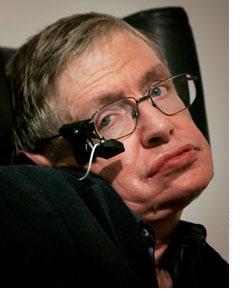Lady Greenfield, former head of the Royal Institution and current professor of synaptic pharmacology at Lincoln College, Oxford, criticised the "smugness" of scientists who claim to “have all the answers”.
She made the comments in a BBC Radio 4 Today programme discussion about Professor Hawking’s views.
Last week he angered many religious believers by saying science “can explain the universe without the need for a creator”.
 In his latest book, The Grand Design, he said: “Because there is a law such as gravity, the Universe can and will create itself from nothing. Spontaneous creation is the reason there is something rather than nothing, why the Universe exists, why we exist.”
In his latest book, The Grand Design, he said: “Because there is a law such as gravity, the Universe can and will create itself from nothing. Spontaneous creation is the reason there is something rather than nothing, why the Universe exists, why we exist.”
He also atttacked philosophers for failing to keep up with modern developments in physics and biology so that “their discussions seem increasingly outdated and irrelevant”.
Lady Greenfield said: “Science can often suffer from a certain smugness and complacency. Michael Faraday, one of the greatest scientists, had a wonderful quote, he said: ‘There’s nothing quite as frightening as someone who knows they are right’
“What we need to preserve in science is a curiosity and an open-mindedness rather than a complacency and a sort of arrogance where we attack people who come at the big truths and the big questions albeit using different strategies.”
Asked whether she was uncomfortable about scientists making comments about God, she said: “Yes I am. Of course they can make whatever comments they like but when they assume, rather in a Taliban-like way, that they have all the answers then I do feel uncomfortable. I think that doesn’t necessarily do science a service.”
She was also critical of Prof Hawking's comments about philosophy, saying: “Scientists have a duty, if they want to have people who aren’t scientists to appreciate that value of what they are doing, if they want to place it into a wider social and moral context, the duty is on the scientist to explain in words ordinary human being can understand. What is dangerous…is to make sweeping assertions about a whole category of academia.”
She later claimed her Taliban remarks were "not intended to be personal", saying she "admired Stephen Hawking greatly" and "had no wish to compare him in particular to the Taliban".
However, she added that his statement that God was not needed was "surprising".
She said: "All science is provisional and therefore to claim to have the definitive answer to anything is a hardline view. It would be very great shame if young people think that to be a scientist you must be an atheist. There are plenty of scientists, such as genome researcher Francis Collins, who also have Christian faith."
Her remarks are likely to be interpreted as a criticism of Professor Richard Dawkins, the prominent atheist and bestselling author of The God Delusion who helped to pay for buses emblazoned with adverts declaring "there's probably no God".
Lady Greenfield, a distinguished neuroscientist who was appointed director of the Royal Institution in 1998, has launched legal proceedings against it claiming she was the victim of sexual discrimination and unfairly dismissed in January.
Rebel members at the organisation failed in their bid to oust its ruling body and reinstate her as the head of the organisation.
Professor Dawkins opposed the moves to reinstate Lady Greenfield, saying: Somebody who is threatening to sue the institution is not someone I would want to be the director.”
Source: Telegraph.co.uk; Author: Alastair Jamieson